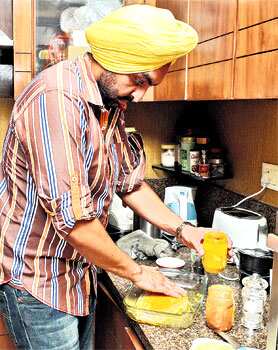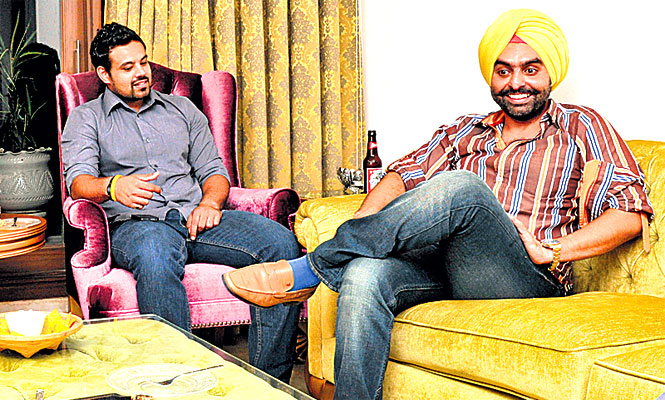In his lair, Ronjan at peace with self
Ronjan Sodhi's exploits at the shooting range are well-documented. But he knows his way around a kitchen, too, and is well known to make a mean 'haldi fish'. From the range to the kitchen, HT brings you a different side to the Khel Ratna-winning trap shooter.
Placed like an arch, an array of evil eyes dot the ornate doorway of the Sodhis’ new house. They’ve been drawn from all corners — Turkey, Indonesia and Sikkim. It isn’t as if the family is overly superstitious but “Ruchika (the wife) felt it was required after London (Olympics)”, says Ronjan.

Smartly turned out, the patka in sync with the dress, he is calm but the beads of perspiration on the forehead give him away. It isn’t the energy-sapping humidity alone. A glance at the watch every now and then as he plays the gracious host to pondering over his five-year-old son’s health, the mind is occupied.
Ruchika and Suryaveer are away, and tracking time is not to keep a tab on their arrival, an official dinner beckons as well. But before he leaves, the ‘Haldi Fish’ has to be prepared for the gathering, including coach, Moraad Ali Khan, and ‘students’, Yogender and Chetan Sansanwal.
The groundwork has been done but it is for Ronjan to give final touches to the Basa fillets. He has always been drawn to cooking, but rustling up culinary delights in the kitchen or barbequing on the terrace now are more about watching what he eats.
The decision to lose weight in the build-up to the Olympics was a well thought out move and no amount of criticism could sway the double trap shooter and Moraad.
Looking out of the glass partition that separates the sitting and dining area, Yogender watches Ronjan marinate the fillets with olive oil, black pepper, salt, turmeric and lemon.

“Criticism is yet to die down,” he says. It was during the trials for the World Championship (in Lima next month) at the Karni Singh Ranges that his temperament was questioned by someone from the fraternity. Ronjan came to know of the remarks minutes before competition. Though irritated, he went on to create a national record of 138 (out of 150) under the new rules.
Lessons from London
The fish is ready to be put in the oven, but he pauses. The incident has taken him back in time. The World Cup final at Maribor was at the doorstep but life seemed bereft of a mission post the London debacle. Ronjan was ready to give it a miss, focusing the gaze at the ceiling as he shared the pain.
This is where Moraad stepped in. “If it’s a no, I let him be. Gradually, we come to an acceptable solution.” To the world, beating Olympic medallists to the silver at Maribor was an affirmation of his class; for Ronjan, it was proving a point to himself. The lessons from London have not only touched his craft, there are telltale signs at home too. For two years till London, the family’s focus had centred on Ronjan and his aspirations. After the Games, facets like a bigger living space have assumed importance.
Ruchika went about giving the new abode the unmistakable touches of a loving homemaker, but her writ did not extend to the terrace and ‘den’. Here, Ronjan’s was the final word. Uninhibited living on farmlands in the border town of Ferozepur not only introduced him to guns early on, he knew the virtues of open spaces, more so now after years of training in remote parts of Italy under foreign national coach Marcello Dradi.
Despite the generous dollops of luxury, urban living can get claustrophobic, but Ronjan has created islands of calm. One of them is the terrace. Pieces of furniture are placed in a manner that provide visual relief, and at the far end stands an innovative bar, made up of simple earthen pots and blank ‘Noble Sport’ cartridges. There is diffused lighting and a giant bust of the Buddha adds to the calm.
Comfort zone
The ‘den’, as Ronjan calls it, isn’t what the name might suggest. “If I’m upset, I like to have people around me,” says Ronjan. A giant sofa-cum-bed and some leather settees thrown in, only a chosen few have access to the space. The giant home theatre system doling out numbers, depending on the mood, old times are relived and plans made for the morrow. The emphasis on ‘friends’ is marked.

“The London experience has left me a better judge of people. My circle has shrunk, I now hang out with people who matter,” he says. Ronjan disappears in the kitchen once more. The mood is upbeat so the Bowers & Wilkins speakers in the living area are belting out popular Bollywood item numbers. Another pair in the dining area ensures that the man is within earshot of his type of music.
Family guy
Over dimsums, the conversation drifts towards familial ties. Long before they tied the knot, Ronjan had prepared Ruchika for prolonged periods of absence, brought about by competition and training stints in Italy. Now, Suryaveer has come to accept it too.
“It’s just that his list of demands depend on my time away from home,” he grins. Hankering is a part of growing up but exposed to the father’s exploits from the start, the five-year-old has shown startling clarity of thought.
Titled, ‘when I grow up I want to be like dad’, the photo collage of a victorious Ronjan in various poses at the 2010 Lonato World Cup has for long been accorded a pride of place in the child’s room. Now, Suryaveer is embarking on a similar journey.
Pointing to the lone medal below the collage, Ronjan remarks, “For him, medals are to be framed.” That it was from a fancy dress competition at school meant little — all activities are centred around Suryaveer.
A worried Ruchika is back with Suryaveer, the body burning with fever. Silence speaks louder than words in the Sodhi household. After the trauma in London, not a word was exchanged but their eyes met before Ronjan and Moraad made their way to the players’ rest area. Once again, the message was conveyed through glances. It was time for us to leave.





